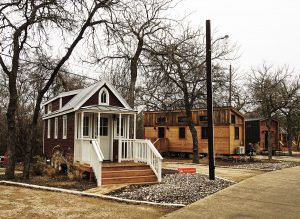 Creating America’s Safety Net
Creating America’s Safety Net
Against the humanitarian tragedies playing out with increasing magnitude, there is a surprisingly simple solution that can provide both immediate and long-term relief for the most vulnerable segments of our communities.
This idea is not something new but is a remarkable reimagining of something our society very likely has undervalued or viewed negatively as an option of last resort.
You know it by different names: A trailer. A mobile home. A tiny home on wheels. But what it really represents is a readily adapted intervention to provide immediate housing and vital life-sustaining services for unsheltered populations and homeless, which are increasing in numbers by intensifying poverty and social disenfranchisement. Quantities of these types of shelters already exist in large inventories managed mostly by private ownership. They are quick and inexpensive to manufacture and deploy and can be customized for specific needs and purposes.
More traditional interventions such as new apartment construction and/or repurposing of apartments and motels cannot keep pace to quickly and affordably meet this growing demand. Indeed, the ratio of comparative cost savings is approximately ten to one. Further, repurposing motels and apartments does not address the needs of the communities within the homeless communities.
What distinguishes this innovative leap forward in utilizing trailers or tiny homes concerns how these units can be aggregated into instant communities instead of temporary bridge housing used in times of natural disasters. Most importantly, these potential near future “villages” could foster an intimate sense of community, promote self-reliance, sustainability and improved quality of life while providing inhabitants with a secure and stable home environment to better their health and well-being. Already, there are some encouraging examples of such communities both in the US and around the world where this idea is not only solving complex social issues but demonstrating design qualities that make it a positive life-style choice.
Among the many services and amenities that make these villages vibrant include specialized healthcare, career and skills guidance, recreation facilities, community gardens, online and in person schooling, counseling and mentoring, socialization, transportation and centralized food service (with options to eat together or apart), among others.
Importantly, applications of this approach can be customized for optimum benefit for single women and families on the streets, veterans, unemployed and financially devastated, the mentally ill, alcohol and substance abusers, victims of domestic violence and others.
Here are a few of the many reasons why it is time for a change in our approach to homelessness:
- New apartment construction and/or the repurposing of apartments and motels cannot keep pace (quickly and affordably) to meet the growing demand.
- The ratio of comparative cost savings is approximately ten to one.
- Trailer units can be aggregated into instant communities instead of the temporary bridge housing we have been using in times of natural disasters.
- Trailer villages can foster an intimate sense of community, promote self-reliance, sustainability and improved quality of life while providing inhabitants with a secure and stable home environment.
- There are a limited number of encouraging examples of communities in the US and around the world where this idea is succeeding.
- Trailer Communities have design qualities that make them a good life-style choice.
- This approach can customize services for single women, families, veterans, those dealing with mental health issues, alcoholism and substance abuse, and victims of domestic violence, among others, with intention and purpose and with programs that most effectively serve their diverse needs.
- City/county and state governments have an abundance of unused land that could be donated and/or rezoned quite easily.
- In addition to being a viable long-term solution for homelessness, Trailer Village Communities can provide temporary/emergency housing for those who find themselves unemployed, underemployed or displaced by a national disaster.
- Scaling the trailer industry can create millions of jobs, including in the auto industry